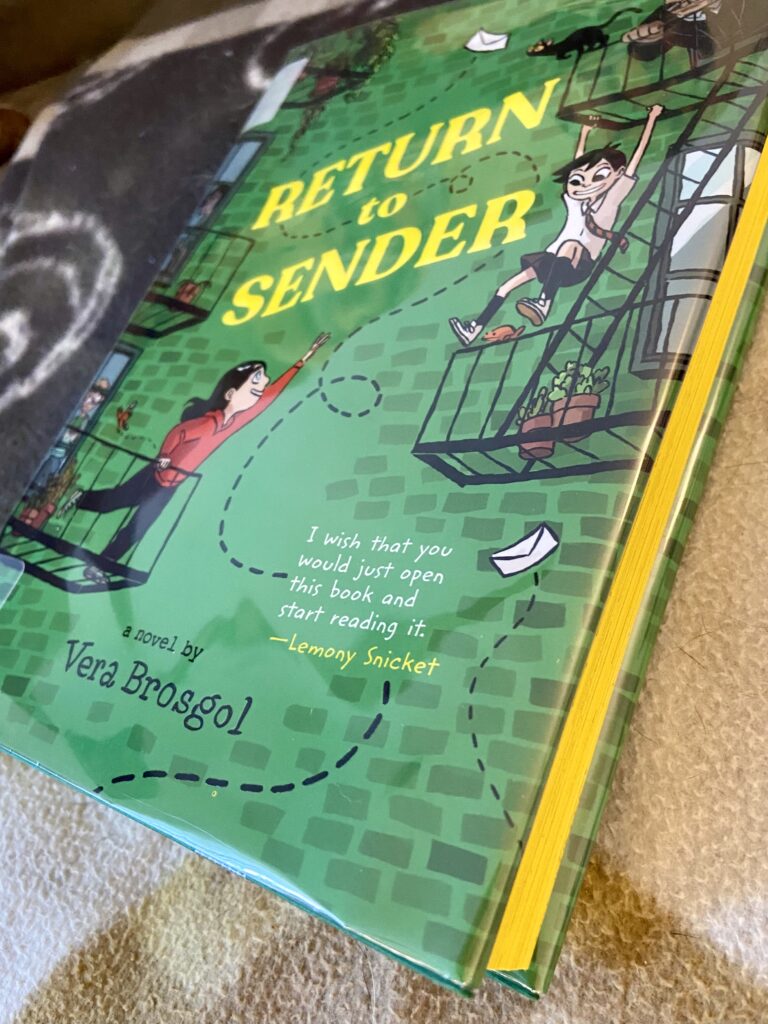
I’ve written about this in previous posts, but I was reminded today just how much I enjoy reading and talking about stories with my teenagers. We are currently in the middle of a new read aloud, Return to Sender, I discovered at our favorite local library branch. I was drawn to it in part because of the bright yellow adorned edges of its pages; my youngest was drawn to it because she recognized the author’s name, Vera Brosgol, as the writer of two graphic novels my youngest enjoys and also owns. Obviously, we dove in pretty quickly and we are being taken on a bit of a rollicking wild and slightly cringe-inducing ride of a story.
One of the things I adore about these two awesome young women is the insight they bring to the stories we read as well as the fantastic conversations stories like this one tend to spark for us. So far, every time I’ve picked up the book and we’ve read a few chapters, there is a lot to discuss along the way as each of them provides commentary on the events and characters within the story. Their discussions go well beyond just the who and what of the story at hand; they dive deeply into the bigger issues at play in the stories we read, including this one, which has an interesting perspective on consequences and desires and perceptions, both of self and others.
The premise of this particular book revolves around a seemingly magical mail slot that grants the wishes of a young protagonist of 10 (Oliver) and his trusty sidekick of a friend who is 9 (Colette). There’s a bit of mystery—how are the wishes granted? And there’s a lot of head shaking from us because it doesn’t take long for the reader to realize that the things Oliver is receiving for “free” are actually coming at the expense of others. This is alluded to in the jacket copy: Oliver wishes his life could be easier. And one day, after slipping a note with a wish into a mysterious mail slot, it suddenly comes true. Pizza for dinner? Yes! The rarest sneakers in the world? Yes! Everything he could ever want, without spending a cent? Yes, yes, yes! Oliver’s dreams are finally within his grasp…but what happens when he discovers that his wishes don’t come for free?
This premise and the way the writer chooses to portray the events have definitely provided us a lot to consider and discuss. Today, my 17 year old mused aloud that perhaps this middle grade book shouldn’t necessarily be for such a young audience. Some of the consequences feel a bit harsh and hard to absorb even for my teenagers. Of course, there is plenty of humor mixed in along the way and the sidekick character is great comic relief (even though her side story has its own challenges as a kid whose parents are never around so that she is left in the care of various nannies and bodyguards).
This book is not the first time I have enjoyed exploring the complicated ways of the world with my teens. Just recently we got involved in a conversation about dystopian novels and their cautionary tales. I have had each of my girls read The Giver, the older reading the actual novel and the younger reading the graphic novel. One of my favorite things is listening to the strong reactions and opinions my teenagers bring to the discussion we have about these and other stories. They are keenly aware of the messages being portrayed and I see how it shapes their thinking; truly it is a delight to witness as they come to understand things in new ways and apply their critical thinking skills to each new story they encounter. In fact, there are times I hear myself in their words and it inspires an innate joy and brings a smile to the corners of my mouth as we read and talk through some intense topics.

We have no idea where this particular story, Return to Sender, is leading us, but I am thrilled to be on this story journey with these two insightful young women. I just love that I get to take these kinds of reading adventures with my teen girls right now. I love the conversations. I love listening to them as they talk through the story and their own ideas. I love seeing how they see the world and how they are developing their own ideas and critical thinking skills that they then apply to the worlds we explore in the different books we read, both fiction and nonfiction. I see my story and their stories being enhanced by the stories we encounter, and that is definitely something for which I am truly grateful because while we don’t know what’s happening in Oliver’s story, I am certainly excited to be a part of my teenagers’ stories.
